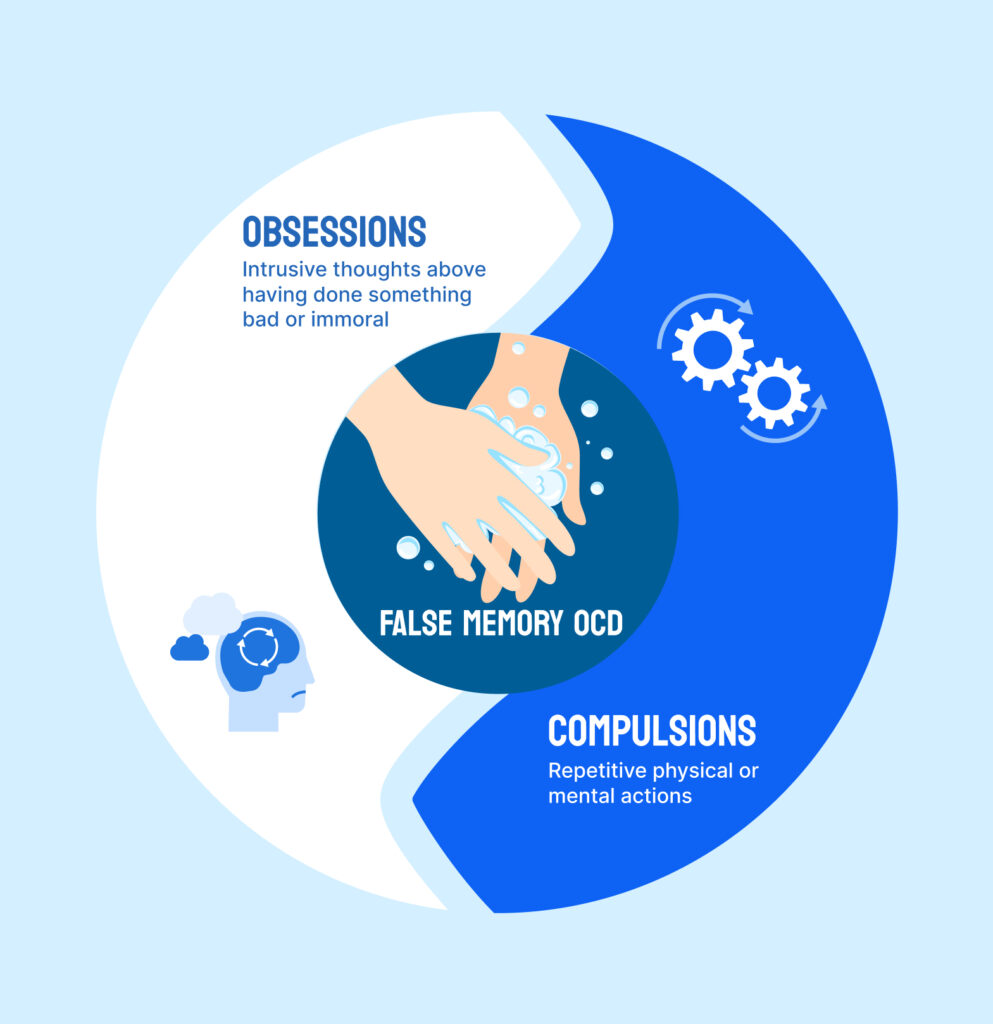If someone regularly finds themself in a state of rumination – or dwelling – on events from the near or distant past, distrusting their memories of the event and worrying they did something wrong, they might be experiencing false memory OCD (obsessive-compulsive disorder), a subtype of OCD.
If confusion about past events leads to persistent anxiety for you or someone you know, the providers on the Klarity platform can help. On Klarity, people can hand-pick their own mental health therapist trained and experienced in OCD treatment.
What is false memory OCD?
The Diagnostic and Statistical Manual of Mental Disorders, Fifth Edition (DSM-5) broadly defines OCD as the combination of obsessions and compulsions “that cause major distress or disruption to daily living.” As an OCD subtype, false memory OCD is also characterized by obsessions and compulsions and a disruption to daily life.
Obsessions are intrusive thoughts, feelings, urges, and doubts, while compulsions are repetitive physical or mental actions performed to relieve anxiety. A person who experiences OCD is trapped in a closed-loop cycle that’s extremely intense and constantly feeds on itself.
People with false memory OCD obsessively doubt their memories of a past event or situation. The doubt includes intense feelings of guilt, shame, and anxiety. Their doubt focuses on moral issues and whether or not they did something bad, inappropriate, or wrong.
They use compulsion to try to validate that they did or didn’t do something wrong, typically without success.
The unique aspect of false memory OCD is that the event may or may not have really taken place. Even when the event did occur, over time, the memory of it becomes distorted by obsessive doubt (thereby making the memory largely false). The “memory” may also be completely made up.
The false memory obsession-compulsion cycle
An example of the obsession-compulsion cycle of false memory OCD looks like this. After going to a convenience store with friends, someone with false memory OCD may worry about whether or not they paid for their items or walked out of the store without paying. This doubt is the obsession and where the cycle starts.
To try to alleviate the anxiety about the potential of stealing, the person may repeatedly look for receipts or seek reassurance from their friends. These actions and thoughts are the compulsions.
But with OCD, even getting confirmation from a receipt and friends may not be enough to stop the rumination about stealing. So the obsession continues. That’s the cycle and it’s often never-ending and so negatively impacts the person’s daily life.

What are the symptoms of false memory OCD?
Forgetting an event or a situation or worrying about one’s actions isn’t enough to diagnose false memory OCD. Someone with false memory OCD is extremely bothered by their doubts, and the memories they create become very real to them. So much so that it impacts their daily life and functioning.
Specifically, the symptoms of false memory OCD include:
- Doubts about a memory, whether real or false, that lead to a high level of anxiety, shame, and guilt
- Doubts of memories that persist even after being reassured about what really happened
- Regularly doubting a lot of memories on a daily and/or weekly basis
- A memory that feels very real even when someone doubts that it is
- Memories focused on being immoral or a bad person
- The obsession of doubting memories has led to mental or physical compulsions
Obsessions common to false memory OCD
The obsessions (intrusive thoughts, feelings, urges, and doubts) common to false memory OCD center on memories that relate to someone’s personal values and whether or not they’re a good person. The obsessions typically involve worries about immorality, including sexual appropriateness, care for others, or doing the right thing.
For example, someone with false memory OCD might doubt a memory about a romantic encounter and begin to obsess about whether the other person consented even though there’s no indication the person didn’t consent. Or they might question whether they meant to hurt their sister when she tripped and fell over the bag of groceries they left on the floor. They may replay these events over and over in their head, each time distorting the memory a bit more toward the negative.
Obsessions for some people with false memory OCD start with a feeling rather than a thought. In this scenario, the person uses their feelings of guilt, shame, or anxiety to validate that they did something wrong even when they didn’t. They then begin to make up memories of why they feel so guilty or shameful.
Compulsions common to false memory OCD
Compulsions (repetitive physical or mental actions) are used to relieve anxiety about the obsessions of false memory OCD can be physical or mental. While they may relieve the anxiety or intense feelings of shame and guilt for a while, compulsions also reinforce the obsession and keep the negative loop that is OCD spinning.
Compulsions of false memory OCD can include:
- Seeking assurance from friends and family that a memory is incorrect
- Reviewing the memory over and over, hoping to find the truth
- Revisiting the place where the event occurred or recreating a scenario hoping to find answers
Because the false memory seems so real, some people even go as far as to confess to the false memory of bad behavior in hopes that it will stop their obsessing and their overwhelming anxiety.
What triggers false memories in OCD?
OCD is an anxiety disorder and, like other anxiety disorders, can be triggered by stress, sleep deprivation, previous trauma, medication, and/or physical health issues. What specifically triggers a false memory, however, is uncertain.
Since the fear in false memory OCD is typically anchored in morality concerns, someone may be triggered by past trauma or a fixation on self-worth. In addition, how real a false memory seems, based on the significance and emotional intensity of the memory, is triggering in itself because our brains store false memories the same way they do real memories.
What is false memory OCD vs real event OCD?
False memory OCD includes both real events that become distorted and completely made-up events, while real event OCD relates to things that did happen.
In real-event OCD, someone ruminates about how they handled a real situation – one remembered accurately. They feel deep regret, guilt, or shame over the past and often look for ways to punish themselves for how they handled a situation.
Other subtypes of OCD
According to the International OCD Foundation, there are many subtypes of OCD. A few of the more common are included here.
| Subtype of OCD | Definition |
| False memory OCD | Someone doubting real or false memories and fearing that they behaved immorally or in a way disconnected from personal values. |
| Real event OCD | Ruminating or punishing oneself for how a real event or situation was handled. |
| Hoarding OCD | Someone collecting so many items, even things with little value, to the extent that they can’t use their living space. |
| Violent OCD | Fear of impulsively harming oneself or others; concern with violent images. |
| Relationship OCD | Excessive concern regarding the quality and flaws of one’s partner, relatives, or friends. |
| Contamination OCD | Fear of touching something perceived to be dirty or contaminated. |
| Perfectionism-related OCD | Excessive concern about symmetry, exactness, and performing tasks perfectly; fear of making mistakes. |
| Responsibility OCD | Fear of being responsible for something terrible happening or harming someone. |
What causes false memory OCD?
The causes of OCD are unclear, but they’re likely due to a combination of family history, stress, trauma, and a deficit in the brain’s chemical messengers or neurotransmitters.
Outside of family history, stress is a significant factor in causing the onset of false memory OCD as well as worsening its symptoms. With higher levels of stress and stress hormones in the body, a person with a predisposition toward OCD may experience an increase in intrusive thoughts, feelings, and urges. These, in turn, fuel false memory obsessions, which leads the person to seek relief from compulsions.
Is false memory OCD treatable?
According to the Mayo Clinic, like other anxiety disorders, false memory OCD is treatable. Depending on the severity of symptoms, treatment may include a combination of therapy and medication.
The most common therapy for treating OCD is cognitive behavioral therapy (CBT). With this treatment modality, a therapist helps you reframe negative thoughts (obsessions) and adjust your maladaptive behaviors or reactions (compulsions). Sometimes, it helps to uncover where or why the obsession started, but other times, it’s enough to understand that the obsessions and compulsions are symptoms of an anxiety disorder. In either scenario, the therapist works with the client on developing coping skills that let them change their reaction to the intrusive thoughts.
Under the umbrella of CBT is exposure and response prevention (ERP), in which a trained therapist helps someone tolerate exposure to the obsession without responding to it. Over time, the anxiety of a false memory decreases, eliminating the need for the compulsion and thereby breaking the obsession-compulsion bond.
Other therapeutic modalities that can help treat false memory OCD are mindfulness and group therapy. Mindfulness techniques, such as deep breathing exercises and meditation, can keep people grounded and lower anxiety, which can reduce the frequency and severity of the OCD cycle. Group therapy lets people with OCD symptoms feel less alone and supported by people who understand them. It can also expose people to other ways of coping as they hear how others manage their symptoms.
Medication may also be a part of a treatment plan. The most common pharmaceuticals used for OCD are antidepressants, including Prozac, Luvox, Paxil, Zoloft, and Anafranil.
How to get help and find treatment for false memory OCD
The best place to get help with false memory OCD starts with talking with a licensed healthcare provider. A provider will diagnose false memory OCD with a psychological and possibly a physical exam to rule out other issues that may be causing symptoms.
Getting professional help is important as symptoms can mimic other anxiety disorders, and OCD may have led to other mental health issues. For example, if false memory OCD impacts someone’s daily functioning for some time, they can also have symptoms of depression. According to Stanford Medicine, depression is the most commonly diagnosed comorbid condition of OCD, followed by anxiety disorders and personality disorders.
Get help and take control of OCD today on Klarity
If you or someone you know are ready for relief from OCD symptoms, get professional help. Online platforms, like Klarity, provide a flexible and affordable option for finding a therapist who meets your specific needs and can create a tailored treatment plan. Find a provider today on Klarity and take control of your OCD, so it stops controlling you.
The information provided in this article is for educational purposes only and should not be construed as medical advice. Always seek the guidance of a qualified healthcare professional with any questions or concerns you have regarding your health.
If you’re having a mental health crisis or experiencing a psychiatric emergency, it’s crucial to seek immediate help from a mental healthcare professional, such as a psychiatrist, psychologist, or therapist. You can also call your local emergency services, visit your nearest emergency room, or contact a crisis hotline, such as the National Suicide Prevention Lifeline, by calling or texting 988 or dialing the Lifeline’s previous phone number, 1-800-273-TALK (1-800-273-8255) in the U.S.
How we reviewed this article: This article goes through rigorous fact-checking by a team of medical reviewers. Reviewers are trained medical professionals who ensure each article contains the most up-to-date information, and that medical details have been correctly interpreted by the author.







